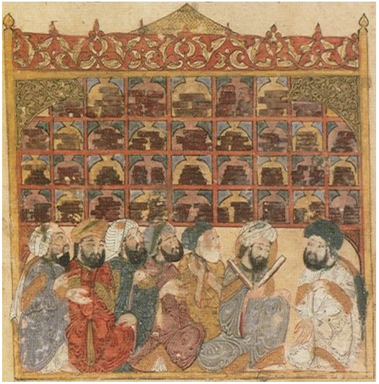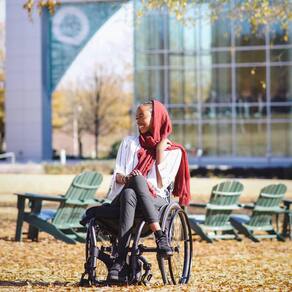 The Roots of Islamic Psychology …..”Ilm al nafs” Why do so many so-called “religious people” see mental illness as incongruous or contrary to faith? This is a question that must be addressed. These assumptions can be rooted in unjustified stigma and ignorance. Mental illness has existed in all times amongst all people. Psychology, the medical and philosophical study of the psych, soul or self, was recorded as early as 1550 BCE when depression was noted in the Ebers Papyrus. One of the earliest noted contributors was a Persian named Muhammad ibn Zakariya al Razi who was a physician, scientist and philosopher. He was noted for writing about mental illness and psychotherapy. His major works called El Mansuri and Al Hawi described many conditions as well as treatment options. He eventually became the first director of a mental health ward in a hospital. The first bimaristans or hospitals were built in Baghdad in the 9th century. Another Persian writer, Abu-Ali al Husayn ibn Abdalah Ibn Sina, more commonly known as Avicenna was a forerunner in the field of psychosomatic medicine. He demonstrated the link between changes in the mental state and changes in the body. Ali ibn Sahl Rabban Al Tabari wrote a work emphasizing the need for psychotherapy. In the 10th century, Ahmed ibn Sahl Al Bakhi stressed the link between spiritual and mental well being. By the 13th century separate wards were made available in the bimaristans for those suffering with mental disorders. These were a few of the pioneers in Islamic psychology that intersected with information of Greek origin within the learning center of Baghdad during the “Golden Age of Islam” from the 8th to the 14th centuries CE. The rest of the world was experiencing what was termed “The Dark Ages” or the “Middle Ages” which began after the decline of the Roman Empire. This was a period of cultural and economic deterioration that occurred in Western Europe. A group of scholars from China, India, Arabia and Ancient Greece exchanging mathematical, astronomical, philosophical, medical information in the learning center of Baghdad. Baghdad, which was centrally located between Europe and Asia, was a major trading spot where ideas were spread for the enhancement of civilization. References 1. Wikipedia contributors, “Timeline of psychology,” In Wikipedia, The Free Encyclopedia, 3 Oct. 2020. Web 2 December 2, 2020 2. Wikipedia contributors, ‘Psychology in medieval Islam’, Wikipedia, The Free Encyclopedia, 26 November 2020. Web 2 December 2020 3. Ayad, Dr. Amira, Healing Body and Soul, 2013, International Islamic Publishing House, Riyadh, Saudi Arabia Ameedah Diaab AbdullahAmeedah has been a mental health consumer for several years and has dedicated her lifework to improving mental health outcomes for others dealing with challenges. She has experience working directly with clients connecting them to services and teaching basic activities of daily living in New Jersey prior to moving to Atlanta.
0 Comments
 Its important to recognize that this pandemic has been a trial that Allah has placed on us during this time. As such marriages will be tested. Tests can make a relationship stronger or no longer. The quality of the pre-pandemic relationship can be the determining factor of how a marriage will sustain itself while we shelter in place. The couples who have a healthy loving relationship during normal times will not have any difficulty spending quality time with their mates during these times. Many who marry take the ayat from Allah to heart where he stated "They (your wives) are a clothing (covering) for you and you too are a clothing (covering) for them." (Surah 2, Verse187) I view this ayat from the perspective that clothing serves as a protection for us against the elements, similarly marriage serves as a protection from many psychological, physical, and spiritual elements. We must be protective of one another in normal times, and especially so during this pandemic. We do not know how long the world will be in this present state of pandemia. Just as sickness is a means of expiation of sins we have to view the sickness that has enveloped the planet as a means of purification for the planet. With this in mind we have to practice patience with ourselves and with each other. How does the pandemic impact marriages? If we don’t manage our stress and anger it can cause toxicity to be present in the household. "And one of His signs is that He has created for you, spouses from amongst yourselves so that you might take comfort in them and He has placed between you, love and mercy. In this there is surely evidence (of the truth) for the people who carefully think." (Surah 30, Verse 21) We must work to dwell with our mates as Allah ordained in these ayats. We must work to identify means of maintaining tranquility during these times. Here are some suggestions that make weathering this pandemic bearable, and more pleasant: - Pray and fast, and study together more often. - Daily Communications with your spouse that includes active listening. - Allow the relationship to breathe. Take time for yourself, and spend time together. - Establish an exercise regiment individually or as a couple. (Ex. walks, meditation, working out.) - Date safely( Drive-In or movie night @ home, dining out at restaurants that observe pandemic protocols, board games, etc. Above all remember the five love languages as you interact with each other, and know each other’s love language. ( http://www.5lovelanguages.com). The pandemic can be an opportunity to strengthen your bond with your mate. Use the time that Allah has given us wisely; so that when it is lifted our love cups will be overflowing. “ The Best Of You Are Those Who Are Best To Their Women.” Prophet Muhammad (ﷺ) Imam Nadim Sulaiman Ali, LPC,MAC Nadimali.com 01/05/1442 A.H.- 08/24/2020 C.E. Nadim Ali LPC, MACBorn in Chester, Pa. Married father of 5. Imam of the Community Masjid of Atlanta since 2005. Former convener for the Majlis Ash-Shura of Atlanta. Founding member of MANA(Muslim Alliance Of North America) & current member of the MANA Diwan. Co- Founder of the Da’wah Ensemble Spoken Word Acappella Group. MA in Counseling Psychology, Georgia School Of Professional Psychology. Licensed Professional Counselor(LPC) & Master Addiction Counselor in private practice.  Qadr. A simple four-letter word yet a difficult concept to grasp. One of the pillars of Imaan, to believe in fate—good or bad. I never truly understood the meaning of this as a child when I learned the pillars at Saturday and Sunday school. I have gained new insight of Qadr over time. I would like to give you a glimpse of my journey, including my struggles with grasping Qadr. During my senior year of high school, my family and I were in a motor vehicle accident. Alhamdulilah, we all survived but not without injuries. My mother broke her chest and fractured her ankle, my younger sisters suffered concussions and a sprained ankle, and I severed my spinal cord, leaving me paralyzed from mid-chest down. I distinctly remember the moment of impact. I felt excruciating pain and could not breathe. I believed I was seconds away from death. I repeated “La ilaaha ilall laah” and attempted to feel and move my legs, but to no avail. The months and years following were a challenging time for me and my family. I had several surgeries, was admitted to a rehabilitation center for extensive physical and occupational therapy, and had to learn how to navigate the world differently—being in a wheelchair. At the time, I did not understand the severity of the situation. The independence I once had was stripped from me. I thought I was being punished. I shifted away from Allah and friends and withdrew to myself. I was scared to venture out into the world differently abled. With the support of my friends and family, I was able to conquer my fears. Despite my adversities, I continued to shine a bright light in my community through the continued support. I completed coursework at the hospital to ensure I could graduate high school on time. I then moved on to college, in which I participated in many clubs and continued to blossom while navigating my new lifestyle. In Fall 2018, I graduated Summa Cum Laude with a Biochemistry degree in hopes to start medical school, insha’Allah. I regained that independence I believed I lost. Qadr comforts me. It is also a concept I still have difficulties with. I continue to remind myself what is written, is what will occur. Allah knows best. He knows best for me and for mankind. This grounds me and aids in my perseverance. Despite unfortunate circumstances, there is light at the end of the tunnel. If I have learned one thing, it is that your circumstances do not define who you are, but they can and do shape you. Alhamdulilah for what I have endured, will endure, and will continue to endure. Edil NourEdil Nour is a 24 year old first generation Somali American. She was born and raised in Georgia. She currently resides in Lawerenceville, GA with her family. Edil is pursuing a career in the medical field. |
Don't miss another edition of A Message from Makkah. Click the button below to join our mailing list
Contact Us for Advertising Opportunities!
Archives
January 2023
Categories
All
Our Sponsors |
Makkah International Institute
 RSS Feed
RSS Feed